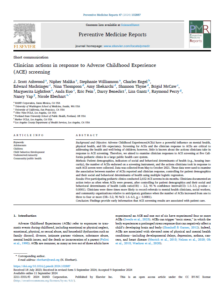
Adverse Childhood Experiences (ACEs) significantly affect long-term physical and mental health outcomes. California’s ACEs Aware initiative promotes screening and response to childhood trauma in its Medicaid system. This study analyzed clinician actions following ACE screenings in five Los Angeles County pediatric clinics, focusing on the association between the number of ACEs and subsequent clinician actions.
The study revealed that clinicians were twice as likely to take action when ACEs were present, with an increasing likelihood of referrals to mental health, social work, and community-based organizations as the number of ACEs increased. While 56% of screens reported no ACEs, clinicians documented actions in 86% of cases with four or more ACEs. These findings underscore the impact of ACE screenings in driving trauma-informed care and highlight the need for robust referral systems and follow-up mechanisms.
The study provides critical insights into the role of ACE screening in influencing clinician behavior and patient care in pediatric settings, advancing the principles of trauma-informed care in public health.